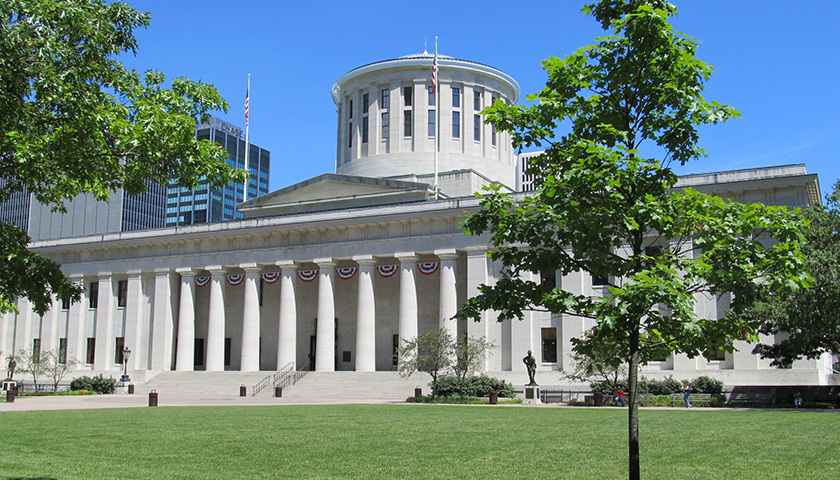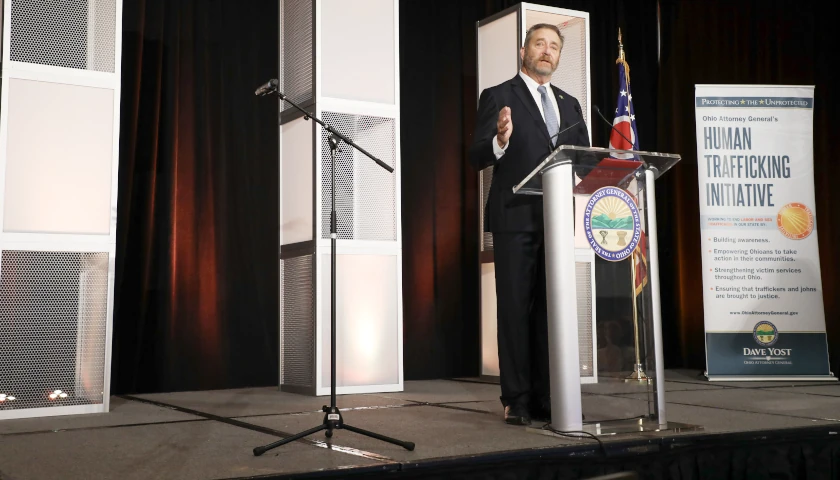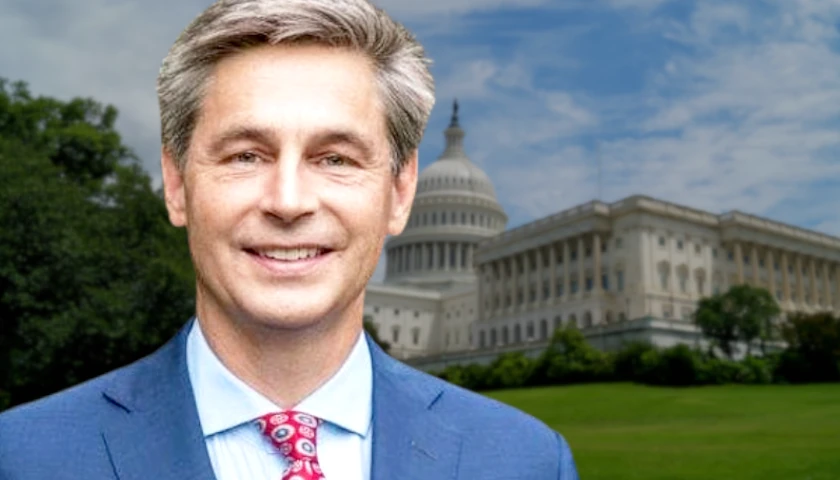COLUMBUS, Ohio – A bill aimed at wiping records and returning fines to businesses cited for COVID violations is gaining momentum in the Statehouse, according to the legislation’s primary sponsor.
State Rep. Derek Merrin (R-Monclova) said in a phone interview with The Ohio Star that House Bill 127 (HB127) “is picking up momentum,” stating that the legislation has two paths to approval by lawmakers.
In addition to continuing to move through the legislative process as a stand-alone bill, an identical provision has been wrapped into the House version of the state budget, in Section 701.60, Merrin said. HB127 passed out of committee last week. Ohio Speaker of the House Bob Cupp (R-Lima) will determine whether the bill gets scheduled for discussion and a vote.
If approved in the House, HB127 would then be sent to the Senate where it would need to be assigned to a committee for consideration before it is sent to the floor for a vote. Once it is passed by both chambers, it would be sent to the Governor.
The meat of the measure is twofold:
- expunges the records of all businesses whose files reflect violations of codes, orders or rules enacted by state agencies or local boards of health related to the State of Ohio COVID response;
- returns to businesses penalties and fines paid for violations.
The erasures and refunds reach back to March 14, 2020 and will extend forward.
In a February interview State Rep. Merrin said, “Our businesses have suffered enough. Punitive fines accomplish nothing at this time. Orders are ambiguous and constantly changing – it’s unfair to hold businesses to these orders.”
He went on to explain the “why” behind drafting the proposed law:
A business owner cannot help if a customer lowers a mask below the nose or stands 71 inches rather than 72 inches from someone. How can a business owner control that? It’s completely unreasonable.
These violations are not criminal court citations, so these individuals never had the opportunity to appear before a judge. We are talking about an agency that wants to act like a quasi-judicial arm. Violations are on flimsy legal ground.
Businesses around Ohio are being held liable for the violations of their patrons, according to Ohio State Highway Patrol Staff Lieutenant Craig Cvetan, who confirmed in communications with The Star that the Ohio Investigative Unit will issue a “citation based on the establishment’s compliance with the ODH directives.”
The Ohio Investigative Unit (OIU) enforces orders inked by Ohio Department of Health Director Stephanie McCloud and those of her predecessors by going undercover in bars, restaurants and establishments.
Two videos sent to The Ohio Star may add strong support to State Rep. Merrin’s proposal to hold all Ohio businesses harmless for patron conduct when it unfairly puts a business at risk.
Tipsters allege Ohio Department of Health (ODH) Director Stephanie McCloud and her husband are both captured in the videos, which they say were shot on two separate occasions inside a Columbus area establishment where there appear to be violations of statewide COVID regulations.
Brad McCloud, Director McCloud’s husband, is a frequent music performer at the venue. He is also an attorney who has been designated as special counsel to Ohio Attorney General Dave Yost. According to McCloud’s website he is authorized to collect debt owed to the State of Ohio.
A retired police and training officer viewed the videos. He told The Star it may take nit-picking to see violations, but it appears that in both there is conduct outside what’s required in orders that were in place at the time – standing and mingling without a mask and being within six feet of others.
He said it didn’t appear that the health director was in violation, but others appeared to be in both videos. The biggest point, said the retired officer, is that it seems “they’re practicing ‘do as I say, not as I do.’”
A second retired law enforcement official reviewed the videos and said, “My anti-quarantine stance supports them living their lives and not playing the mask game, but if she is responsible for enforcing orders then it’s clear she’s operating by a double-standard.”
Ohio attorney Maurice Thompson, who has litigated several cases on behalf of Ohioans contesting ODH orders, saw the videos and stated, “they show she [McCloud] thinks masks aren’t that important.”
Masks are still required to be worn at all times inside unless eating, drinking, or in your residence. They are also required outdoors when within six feet of others, per an ODH order.
Between March 15, 2020 and March 22, 2021, the OIU:
- Issued approximately 265 COVID-related violations
- Conducted 5,501 visits related to the COVID curfew or Rule 80 – limitation on hours for on-premise sale or consumption and expansion of sales of beer, wine, mixed beverages and spiritous liquor.
- Received 1,330 complaints related to health orders
- Issued 330 warnings
The OIU operating budget in 2019 was $12,076,115. In 2020 the unit’s budget was $13,776,113 – an increase of approximately 14%.
OIU investigators issued COVID-related citations for infractions such as:
- failing to ensure all patrons and staff maintain a distance of six feet or greater;
- disorderly activities;
- creating a condition that presents a risk of illness;
- recklessly causing inconvenience, annoyance or alarm by creating a condition that creates a risk of illness;
- selling and allowing consumption of alcohol after curfew;
- selling or furnishing alcohol beverages for on-premise consumption;
- selling alcohol to go without a food order.
Once citations are issued, cases “go before the Ohio Liquor Control Commission for potential penalties including fines and/or the suspension or revocation of liquor permit,” OHP Staff Lieutenant Cvetan said.
A handful of businesses received COVID violations that contributed to the revocation of their liquor permits, according to State Rep. Merrin.
Cvetan stated OIU has received complaints from various sources to include but not limited to, the general public, health departments and law enforcement agencies.
OIU investigators often receive tips in advance of events that may violate health orders and make it a point to visit those events.
The Star requested a list of all establishments investigated for COVID-related matters as well as those that received warnings. That information was not available by press time.
Meanwhile, at least 265 establishments have been cited, fined, and money collected over ODH orders that state courts have ruled are impermissible.
In April, an Ashland County judge released his written decision in a case where a restaurant sought to stop the local health department from revoking its food service license in response to restaurant employees not wearing masks. Common Pleas Court Judge Ronald P. Forsthoefel ruled the ODH lacked statutory authority to issue masking, social distancing and other orders. Forsthoefel went on to state that orders “fail to accomplish anything scientifically demonstrable, or otherwise corroborated with empirical data.”
Governor DeWine’s Press Secretary Dan Tierney told The Star, “The state was not a party to this case, and the case is irrelevant to the current state protocols.”
When asked why the Governor is not listening to Ohio judges elected by Ohioans who have ruled ODH orders statutorily and constitutionally impermissible, Tierney wrote that “[s]everal other courts have held that Ohio’s protocols have been issued lawfully.” However, Tierney did not cite courts or cases to support his assertion.
Prior to leading the ODH, Stephanie McCloud was Administrator/CEO of the Ohio Bureau of Workers’ Compensation. Neither the ODH nor Brad McCloud responded to inquiries for comment.
– – –
Jack Windsor is Statehouse Reporter at The Ohio Star. Windsor is also an independent investigative reporter. Follow Jack on Twitter. Email tips to [email protected].
Photo “Ohio Statehouse” by Ohio House of Representatives Republican Caucus.





